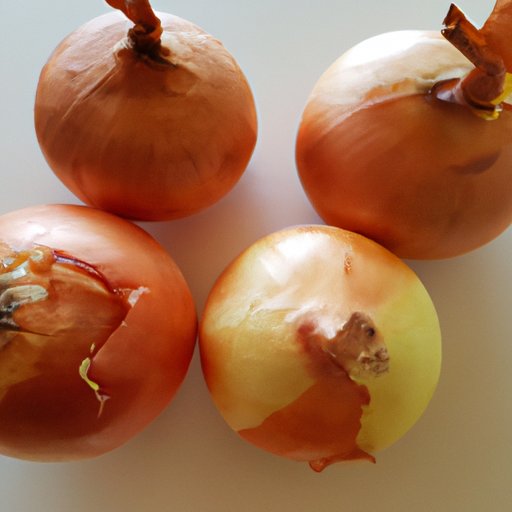Are yellow onions good for you?
If you’ve ever wondered about the health benefits of yellow onions, you’re in the right place. Yellow onions are a staple ingredient in many cuisines around the world, known for their distinctive flavor and aroma. They are also rich in nutrients and compounds that have been linked to a range of health benefits. In this article, we’ll explore the science behind the health benefits of yellow onions and provide tips on how to incorporate them into your diet.
Health benefits of yellow onions
Yellow onions contain a variety of nutrients, including vitamins, minerals, and antioxidants. Here are some of the health benefits associated with consuming yellow onions:
Boosting the immune system
Yellow onions are rich in vitamin C, a powerful antioxidant that helps protect the body from damage caused by harmful free radicals. Vitamin C has also been shown to boost the immune system, improving the body’s ability to fight off infections and diseases.
Fighting inflammation
Yellow onions contain a compound called quercetin, which has been shown to have anti-inflammatory properties. Inflammation in the body can lead to a range of health problems, from arthritis to heart disease. By including yellow onions in your diet, you may be able to reduce inflammation and improve your overall health.
Preventing cancer
Research suggests that consuming yellow onions may help reduce the risk of certain types of cancer, including colon, ovarian, and prostate cancer. This may be due to the presence of sulfur compounds, which have been shown to have anti-cancer properties.
Aiding digestion
Yellow onions are high in fiber, which can help promote healthy digestion and prevent constipation. The fiber in yellow onions also helps regulate blood sugar levels, making them a great choice for people with diabetes or those looking to manage their blood sugar.
Studies suggest that consuming yellow onions may also have other health benefits, such as reducing the risk of heart disease and stroke. While more research is needed to fully understand the health effects of yellow onions, there is growing evidence to suggest that they can be part of a healthy and balanced diet.
Nutritional value of yellow onion
Yellow onions are low in calories but high in nutrients. One medium yellow onion contains:
- Calories: 44
- Protein: 1 gram
- Fat: 0 grams
- Carbohydrates: 10 grams
- Fiber: 2 grams
- Vitamin C: 16% of the Recommended Daily Intake (RDI)
- Vitamin B6: 5% of the RDI
- Folate: 5% of the RDI
- Potassium: 6% of the RDI
- Manganese: 5% of the RDI
Yellow onions also contain small amounts of other vitamins and minerals, such as calcium, iron, and magnesium. This makes them a great addition to any healthy and balanced diet.
Yellow onions in cooking and recipes
Yellow onions are incredibly versatile and can be used in a variety of dishes. They are commonly sautéed or caramelized to bring out their natural sweetness and enhance their flavor. They can also be used raw in salads or as a garnish.
Here are some simple yet delicious yellow onion recipes to inspire you:
- French Onion Soup
- Caramelized Onion Tart
- Grilled Onion Skewers
- Roasted Onion and Garlic Soup
- Onion and Tomato Salad
In addition to enhancing the flavor of dishes, yellow onions can also add nutritional value. For example, adding sautéed onions to scrambled eggs can increase the protein and fiber content of the dish. Similarly, adding onions to a stir-fry can increase the vitamin C content.
Yellow onions vs other onions
Yellow onions are just one type of onion, and there are many different varieties to choose from. Here’s how yellow onions compare to two other popular types of onions:
Red onions
Red onions have a deeper, more mild flavor than yellow onions. They are also higher in antioxidants, specifically a compound called anthocyanin, which gives them their distinctive red color. Red onions are often used raw in salads or as a garnish, but they can also be cooked.
White onions
White onions have a sharper, more pungent flavor than yellow onions. They are often used in Mexican cuisine, as well as in soups and stews. White onions are also lower in calories than yellow onions, but they are not as rich in nutrients.
Risks and precautions associated with consuming yellow onions
Most people can safely consume yellow onions as part of a healthy and balanced diet. However, there are a few risks and precautions to be aware of:
Allergic reactions
Some people may be allergic to onions, which can cause symptoms such as hives, stomach pain, and difficulty breathing. If you experience these symptoms after consuming onions, seek medical attention immediately.
Sulfur content
Yellow onions, like all onions, contain high levels of sulfur compounds. While these compounds have been linked to a range of health benefits, some people may be concerned about their potential health effects. To mitigate this risk, be sure to wash and peel your onions properly before consuming them. It’s also a good idea to avoid consuming excessive amounts of onions if you are sensitive to sulfur.
Conclusion
Yellow onions are a flavorful and nutritious ingredient that can be used in a variety of dishes. They are rich in vitamins, minerals, and antioxidants, and have been linked to a range of health benefits. By incorporating yellow onions into your diet, you can improve your overall health and well-being.
(Note: Is this article not meeting your expectations? Do you have knowledge or insights to share? Unlock new opportunities and expand your reach by joining our authors team. Click Registration to join us and share your expertise with our readers.)
